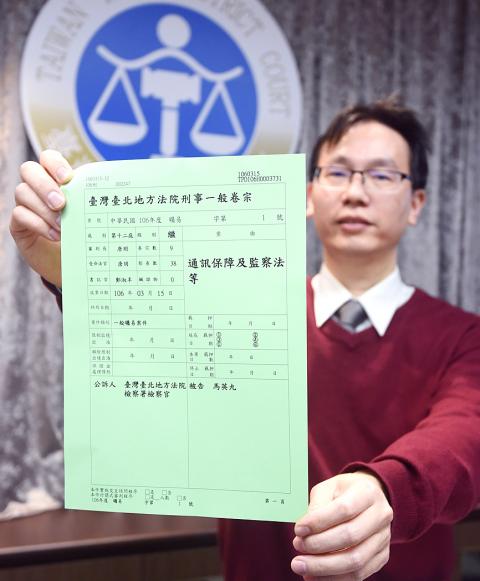The Chinese Nationalist Party (KMT) caucus yesterday lamented what it called “the death” of the nation’s constitutional system, which it ascribed to the Taipei District Prosecutors’ Office’s decision to indict former president Ma Ying-jeou (馬英九).
Speaking at a news conference in Taipei, KMT caucus convener Sufin Siluko (廖國棟) said that as the Classified National Security Information Protection Act (國家機密保護法) entitles the president to declassify information, Ma’s handling of confidential information regarding a wiretapping case should not have been deemed illegal.
Sufin was referring to Article 7 of the act, which stipulates that the president, premier and ministers authorized by them are allowed to classify information top secret, as well as Article 28, which stipulates that classified information may be declassified by the official who authorized the original classification, or their superior official.

Photo: Liao chen-huei, Taipei Times
Ma on Tuesday was indicted on charges of leaking classified information and abuse of authority.
He is accused of divulging details to two government officials of wiretapped telephone conversations between then-legislative speaker Wang Jin-pyng (王金平) and Democratic Progressive Party (DPP) caucus whip Ker Chien-ming (柯建銘) during a then-ongoing investigation into alleged improper lobbying in 2013.
It is preposterous that the people who sought to damage judicial justice by engaging in improper political lobbying got off scot-free, while the person who tried to deal with wrongdoings is facing indictment, KMT Legislator Alicia Wang (王育敏) said.
“I solemnly urge the judicial system to refrain from playing politics,” she said.
The DPP has been interfering with the judicial system since former Presidential Office secretary-general Chen Shih-meng (陳師孟) on March 5 accused the judiciary of targeting only the pan-green camp, KMT Legislator Lai Shyh-bao (賴士葆) said
Chen also vowed to redress the what he described as the procedural injustice experienced by former president Chen Shui-bian (陳水扁), who was found guilty of corruption and related charges and served more than six years of his 20-year prison term before his release on medical parole in January 2015.
“Shortly after that, the Supreme Administrative Court on Friday last week ruled against the KMT in a fund-freezing case. The verdict was followed by Ma’s indictment on Tuesday,” Lai said, adding that Chen Shih-meng’s remarks have apparently had a chilling effect.
In related news, the Taipei District Court yesterday made public the computer-generated random number draw that decided which judge would review Ma’s case.
The judge picked, Tang Yueh (唐玥) oversaw a case involving the beating death of a police detective a Taipei nightclub in 2014.
Additional Reporting by Chang Wen-chuan

South Korean K-pop girl group Blackpink are to make Kaohsiung the first stop on their Asia tour when they perform at Kaohsiung National Stadium on Oct. 18 and 19, the event organizer said yesterday. The upcoming performances will also make Blackpink the first girl group ever to perform twice at the stadium. It will be the group’s third visit to Taiwan to stage a concert. The last time Blackpink held a concert in the city was in March 2023. Their first concert in Taiwan was on March 3, 2019, at NTSU Arena (Linkou Arena). The group’s 2022-2023 “Born Pink” tour set a

CPBL players, cheerleaders and officials pose at a news conference in Taipei yesterday announcing the upcoming All-Star Game. This year’s CPBL All-Star Weekend is to be held at the Taipei Dome on July 19 and 20.

The Taiwan High Court yesterday upheld a lower court’s decision that ruled in favor of former president Tsai Ing-wen (蔡英文) regarding the legitimacy of her doctoral degree. The issue surrounding Tsai’s academic credentials was raised by former political talk show host Dennis Peng (彭文正) in a Facebook post in June 2019, when Tsai was seeking re-election. Peng has repeatedly accused Tsai of never completing her doctoral dissertation to get a doctoral degree in law from the London School of Economics and Political Science (LSE) in 1984. He subsequently filed a declaratory action charging that

The Hualien Branch of the High Court today sentenced the main suspect in the 2021 fatal derailment of the Taroko Express to 12 years and six months in jail in the second trial of the suspect for his role in Taiwan’s deadliest train crash. Lee Yi-hsiang (李義祥), the driver of a crane truck that fell onto the tracks and which the the Taiwan Railways Administration's (TRA) train crashed into in an accident that killed 49 people and injured 200, was sentenced to seven years and 10 months in the first trial by the Hualien District Court in 2022. Hoa Van Hao, a